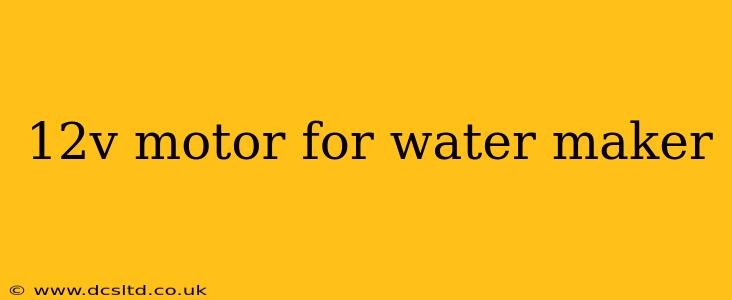Finding the right 12V motor for your water maker is crucial for efficient and reliable operation. This guide delves into the key considerations when selecting a motor, helping you make an informed decision. We'll cover various motor types, factors influencing your choice, and troubleshooting tips.
What are the different types of 12V motors used in water makers?
Several types of 12V motors can power a water maker, each with its own advantages and disadvantages. Common choices include:
-
DC Brushed Motors: These are relatively inexpensive and readily available, but they tend to have shorter lifespans due to brush wear and require more maintenance. Their simpler design makes them easier to repair, however.
-
DC Brushless Motors: These offer longer lifespans, higher efficiency, and less maintenance compared to brushed motors. They are generally more expensive upfront, but the cost savings in the long run often make them a worthwhile investment for water makers.
-
Gear Motors: These motors incorporate a gear reduction system to increase torque while reducing speed. This is often necessary for water maker applications requiring high torque to overcome the pressure of reverse osmosis or other desalination processes. They are available in both brushed and brushless versions.
-
Stepper Motors: While less common in water makers, stepper motors offer precise control over the motor's position and speed. They could be beneficial in applications requiring extremely controlled water flow or pressure.
What factors should I consider when choosing a 12V motor for my water maker?
Selecting the correct 12V motor requires careful consideration of several factors:
-
Voltage: Ensure the motor's voltage rating matches your power source (12V).
-
Power (Watts): The required wattage depends on the water maker's capacity and the pressure needed for desalination. Higher wattage motors offer greater pumping power.
-
Torque (Nm): Torque is the rotational force the motor produces. Sufficient torque is critical to overcome the resistance of the water pump and the membranes within the water maker.
-
Speed (RPM): The speed influences the water flow rate. Consider the desired water production rate when selecting the motor's RPM.
-
Duty Cycle: This specifies the percentage of time the motor can operate continuously without overheating. Water makers often require continuous or near-continuous operation, so a high duty cycle is important.
-
Size and Weight: The motor's physical dimensions and weight must be compatible with the water maker's design and available space.
-
Efficiency: A highly efficient motor consumes less energy, leading to longer battery life and lower operating costs. Brushless motors generally offer better efficiency.
How do I determine the correct size motor for my water maker?
Determining the correct motor size is vital. Insufficient power will result in poor performance, while an oversized motor may be unnecessarily expensive and could potentially damage the system. Consult the specifications provided by your water maker's manufacturer for recommended motor power and torque. If this information isn't readily available, contacting the manufacturer directly is recommended.
What are the common problems associated with 12V motors in water makers?
Potential problems include:
-
Overheating: This often indicates insufficient cooling or an overloaded motor.
-
Stalling: This suggests insufficient torque for the application or a blockage in the water system.
-
Reduced Performance: This could be due to motor wear, a failing component, or decreased voltage.
-
Excessive Noise: Unusual noise might signify issues with bearings or other internal motor components.
How can I troubleshoot problems with my 12V water maker motor?
Troubleshooting involves systematically checking for the issues listed above. Start with simple checks like voltage verification, inspecting for blockages, ensuring adequate cooling, and listening for unusual noises. More complex troubleshooting may require specialist tools and knowledge. If you're uncomfortable working with electrical components, always consult a qualified technician.
By carefully considering these factors and understanding potential issues, you can select and maintain the optimal 12V motor for your water maker, ensuring reliable and efficient operation. Remember to consult your water maker's documentation for specific recommendations.
